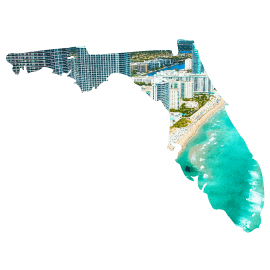Licensure Reciprocity: Florida
Expanding the Pool of Teachers Policy
Analysis of Florida's policies
Regrettably, Florida grants a waiver for its licensing tests to any out-of-state teacher with a comparable standard certificate.
Teachers with comparable out-of-state certificates are eligible for Florida's professional certificate. There is no state-mandated recency requirement; however, transcripts are required for all applicants. It is not clear whether the state analyzes these transcripts to determine whether a teacher was prepared through a traditional or alternate route or whether additional coursework will be required.
Based on statutory language, it also appears that Florida will issue a comparable license to an out-of-state teacher who was prepared under an alternate route.
Florida is also a participant in the NASDTEC Interstate Agreement; however, the latest iteration of this agreement no longer purports to be a reciprocity agreement among states and thus is no longer included in this analysis.
Recommendations for Florida
To uphold standards, require that teachers coming from other states meet testing requirements.
Florida takes considerable risk by granting a waiver for its licensing tests to any out-of-state teacher with a standard certificate. The state should not provide any waivers of its teacher tests unless an applicant can provide evidence of a passing score under its own standards. The negative impact on student learning stemming from a teacher's inadequate subject-matter knowledge is not mitigated by the teacher's having a certificate from another state.
Accord the same license to out-of-state alternate route teachers as would be accorded to traditionally prepared teachers.
Florida should consider discontinuing its requirement for the submission of transcripts. Transcript analysis is likely to result in additional coursework requirements, even for traditionally prepared teachers; alternate route teachers, on the other hand, may have to virtually begin anew, repeating some, most or all of a teacher preparation program in Florida. Regardless of whether a teacher was prepared through a traditional or alternate route, all certified out-of-state teachers should receive equal treatment.
State response to our analysis
Florida asserted that it has established full reciprocity with all states, and that a valid standard certificate from another state is verification that the applicant has met all Florida requirements for the professional certificate, including mastery of general knowledge, professional education competence and subject content. Florida further contended that all states require a subject-knowledge test for their professional license, and the state does not accept provisional/emergency certificates for reciprocity purposes.
Florida added that it does not conduct transcript analysis for certification via reciprocity. Transcripts are required to document that the applicant has earned a bachelor's degree from an accredited institution or the equivalent, which is required by law for all applicants regardless of certification pathway.
Last word
Select another topic
Delivering Well Prepared Teachers
- Admission into Preparation Programs
- Elementary Teacher Preparation
- Elementary Teacher Preparation in Reading Instruction
- Elementary Teacher Preparation in Mathematics
- Middle School Teacher Preparation
- Secondary Teacher Preparation
- Secondary Teacher Preparation in Science
- Secondary Teacher Preparation in Social Studies
- Special Education Teacher Preparation
- Assessing Professional Knowledge
- Student Teaching
- Teacher Preparation Program Accountability
Expanding the Pool of Teachers
Identifying Effective Teachers
- State Data Systems
- Evaluation of Effectiveness
- Frequency of Evaluations
- Tenure
- Licensure Advancement
- Equitable Distribution
Retaining Effective Teachers
Exiting Ineffective Teachers
Research rationale
http://www.ncbex.org/ .

